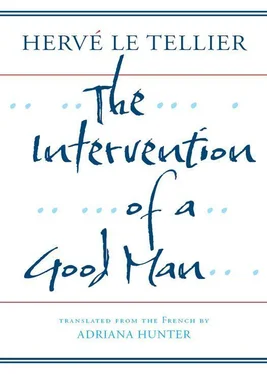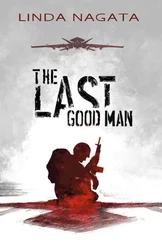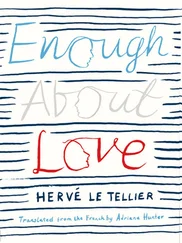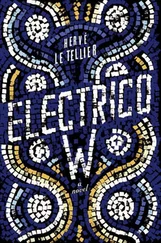He briefly contemplates telling her about the young Polish girl. But what could he say about her, and what would he actually want? To study our heroine’s reaction, provoke some feeling in her, elicit her hypothetical jealousy? Just in time, he grasps that he runs the risk, once and for all, of appearing pathetic and ridiculous. He can just imagine her response — searing and well deserved. So he says nothing.
The Other arrives in three days, and, oddly, our hero is not jealous. Yet he knows everything there is to know about jealousy, that blast of cruel images dominated by sex, bodies, and possession. He looks at our heroine’s blue eyes, her mouth, the curve of her shoulder, he tries to understand why he never succeeded in seeing this Other as a rival, nor in picturing them making love, why, in fact, when he doggedly attempts to re-create the scene — the act, to use a shrink’s word for it — he cannot manage to take it altogether seriously. The memory of their past pleasures protects him from that, at least.
He gives an involuntary little laugh, almost a sigh. What’s funny? she asks.
He shakes his head. Nothing.
She asks him if he is angry with her. And even adds, You have every right.
No, really not, our hero replies. And he is not even cheating. Simply overcome.
He does still have one redeeming phrase on his mind, but abstains from using it. Why do we always push harder on the remote control when the batteries are dying?
Acta est fabula , the ancients used to say.
Our heroine smiles at him, she shivers.
Our hero feels a bit cold too.
They do not finish their beers.
She wants to go home on her own. He offers to take her back. She lets him. They drive to the crossroads of the A32 and the S70, near the sign for Inchna — yes, that’s the one.
He is intent on taking her farther in order to spare her at least the long hill. She refuses to let him go beyond this point. She says it categorically, he does not insist. He has maintained an elegant tenacity, what would he gain from stooping to obstinacy?
He stops the car. She consents to stay a little longer. He begs for a kiss on the lips. She gives him his alms. He feels only shame.
They take the bike from the trunk, and it stains his shirt. Just a few more words, and she hops onto the contraption, puts her weight down on the pedal, and rides off. He watches her cycle away without looking back. His heart and his reason manage to agree not to prolong the episode. He sits down in the Nissan and sets off again. The folded-down seats will no longer serve any purpose.
It is not even half past nine in the evening. Our hero goes back to his hotel. He will have to wait, once again. The plane is tomorrow, in precisely fourteen hours. He makes some notes, sketches out the final chapters, tells himself he will get back to this later.
It is dark in the hotel room. From time to time car headlights are projected on the walls. He switches on the TV. Images and sounds fill the room, which is now plunged in complete darkness. He tries to concentrate on the news. Bomb attacks in the Middle East, Hurricane Myriam in Florida, a new prototype for a car. With a quick flick he switches it off.
Suddenly tired, he brings a hand up to his eyes and, in a gesture that has become a habit, he runs it over his face. He inhales its smell. It held our heroine’s hand, so briefly but for too long, it has captured her smell. He has never missed her so much. In an attempt to escape, he rubs his hands together in a stream of water and lathers them for a long time. The lily of the valley resists the almond’s assault. He takes another shower. The lily of the valley yields at last.

Back to the future .
About the rental car .
An appropriate capitulation .
The fact that he had woken so early did have one advantage: he was really tired. A hypnotic-type sleeping pill plunged him into a dreamless sleep. He gets up at seven o’clock and, on autopilot, takes a shower and goes down for breakfast. It is a luxury hotel with a lavish buffet, and he is the only person there at this time in the morning: he has a salad of fresh grapefruit and strawberries, a yogurt, and some green tea.
Then he pays his bill. The Polish girl is not at reception. Right now he would have liked being entitled to her smile. From the receptionist on duty, he gathers what her name is. Then he quickly writes her a friendly, affectionate note, wishing her success and happiness. Leaves neither his address nor his telephone number, out of propriety. He has tact. Trusting in Google, he does however sign with his first name (and adds his family name in brackets). He tears the page from his notebook, folds it, and hands it to the receptionist, who — and she is betrayed in this by her overly detached attitude — will certainly read his message the moment he has turned on his heel.
Beneath cold, fine rain, he slings his bag in the trunk. Sets off. Drives away. He is not leaving Scotland, but fleeing it. He goes back past the crossroads between the A32 and the S70, and glances one last time at the Inchnadamph sign. He should insist they erect a statue. A concertinaed bicycle, for example. If he’d known … If he’d known, what? He would still have come, he was incapable of not coming. You never can tell. The previous day’s bitterness is fading. I need to leave, he keeps telling himself. Paris is another town, where she won’t be held hostage by anything. That is all he asks.
Our hero drives on. The windshield wipers sweep a leaf toward the hood, mercilessly. He turns on the radio, switches it off right away. He does not want company. In the rain, the journey seems longer. But he reaches the airport two hours early, and hands the car back to Avis. He puts the rear seats up, checks over the bodywork. The Nissan is untouched, not even a scratch.
The girl in a red jacket behind the counter asks him whether everything went well. He says, Yes, thank you, and this standard exchange brings a smile to his lips. It’s not all doom and gloom, he could have had a blowout and missed his flight. He adds, just out of principle, Actually the seats don’t go down flat enough to get a bike in.
So here he is at the airport. Outside it is overcast and pouring rain. From the departure lounge, he calls our heroine to confirm that he is taking off and also, he admits, to hear her voice again. She makes him promise not to contact her again in Scotland. He would not have. She agrees to his doing so as soon as she is back. He is pacified. He feels neither resentful nor bitter, he knows that he still wants to believe in this. He thinks back to what he told her: being in love is when it feels hot inside your head. It was the best he could come up with. He still feels hot enough for two. All in good time.
The lounge slowly fills with people. He drifts. Does he really need a duty-free shop? A fluffy sheep key ring attracts his attention. He smirks.
Is it because the carpets are dirty or something about the way the seating is lined up? Our hero gradually succumbs to all-encompassing melancholy and invasive anxiety. He is suddenly worried that, with her, he will never be able to take anything for granted. Afraid that, with every passing moment, she is leaving his life, abandoning him to his fate as a soon-to-be-old man, that, rather than him, she wants a life with something to look forward to. How can he hold this against her? She is the one with the world at her feet, while our hero feels he is on borrowed time. She is thirty, which is almost twenty. He fifty, which might as well be sixty. If he inverted this morbid logic they would both be the same age, but this is no time for optimism. His spine stoops beneath the absurd superstition of seeing figures in decades. When he plunges into a state of dejection and mental liquefaction like this, our hero feels so old he could make flowers wilt just by touching them.
Читать дальше













